My field term 2 allocation is “work Placement”. This gives me the opportunity to go to a company or organisation that will give me an introduction into where my design career can take me. This was the choice for me as I wanted to explore what it was like to be in the industry before I had to take that leap.
I chose to do my placement at my old college. This was because it gave me the opportunity to investigate teaching and workshop management. As a maker I want to have that option of making things whilst also exploring the option of potentially working in education once I have enjoyed my time in the industry.
Hereford college of arts’ foundation course is a one-year intensive course that helps young artist and designers decide on their place in the various disciplines on offer to them. It also works as a portfolio building course for those who have already gone through education and hope to further their skills and works.
As a student I know that this course completely changed what I expected to do as a creative. I went on to the course expecting to do illustration and photography and left with a desire to work in the world of furniture design.
Week 1
The first day of my placement was more of an introduction into what the students are currently doing. Their current project is impact; this started with a presentation on current problems or themes such as environment, social, charity, and human interaction. The students then explored what this means to them and what ideas or phrases they associate with them. For many common themes were global warming and the effects or modern technology/social media. My role in this was to sit in on their tutorials and try and suggest materials, techniques, designers/artist, and anything else that I felt would help with their development of their projects. This was a great way for me to introduce techniques and methods of thinking that I have picked up since moving away from my foundation.
An example of this was when a student said they weren’t overly fond of drawing and almost tried to avoid it. I suggested that they could try ‘3D drawing’ where they modelled their observations instead of trying to capture them with a pencil.
Tuesday on this course is “drawing Tuesday”. This is a day when the students move away from their projects for the day and focus on developing their drawing skills through life drawing and other observations. I hadn’t done any life drawing since I was on this course and so it was really good for me to be back in that environment, I even had a go at doing a few drawings; I am still not great at drawing.
After this I was asked to attend a meeting about an upcoming community project that a hand full of students have signed up for. It is an opportunity for the students to run a workshop with people suffering with dementia as well as some young children. This is a new thing for the course that wasn’t around when I was on it. It’s great to see that the course is working with the community around it, especially with those that are suffering or need the help.
After talking further with one of the tutors I am being given the opportunity to plan this workshop with the students. This is something that I haven't had to do before and so it could be an amazing chance to discover what it is like to be given the responsibility. My plan will be checked by the tutor for suitability and practicality. However, this is still something that will help me decide if this is the right path for me, which is exactly why I came here.
Image from the life drawing sessions.
The community project is to try an encourage the integration of different generations through the means of art. The older participants tend to be suffering with dementia, therefore the project is run by Dementia Friends, to specifically tailor activities that would be accessible and doable yet stilling engaging.
The initial ideas for the project activities were suggested and chosen by the students. I also found an activity that would be appropriate. There were 3 activities in total they were pompom making, photography, and quilling. There are two sessions that will be taking place however the activities need to be approved by the people running the sessions hence why there are several options in case they feel that some are not appropriate.
As part of the preparation for this I was asked to complete 3 lesson plans which was something that I haven't had to do before. This was a good insight to what I would have to do if I choose to go into education.
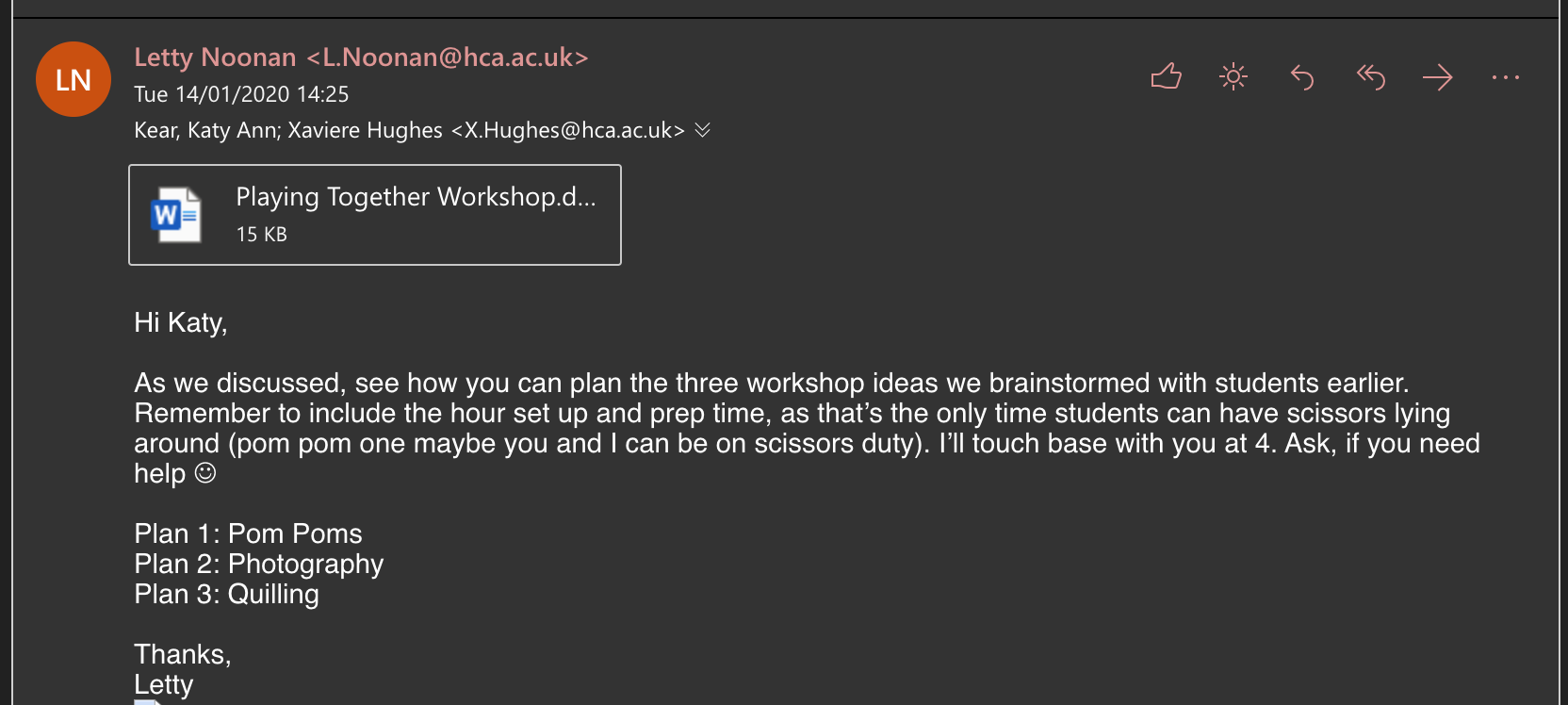

Sample of the lesson plan used.
The lesson plans needed to be thorough and well thought out. This included listing what materials would be needed, what quantities, and how long the students would be given. They also had to include the lesson objectives; this meant what the students would be gaining from the session and also what they had to achieve by the end of it. Since this was a plan for a workshop with dementia patients the focus is less on what they were producing and more on how they were interacting with them. Most of them will probably just want someone to talk to and will be less focused on the actual activity. The activities chosen were considered for certain aspects; the students had previously had a lecture on the benefits of photography on people who were in prison, as well as reading up on an article. The benefits of photography would be that it could create a hobby that may help them remember events or people, or generally act as a prompt/ trigger; one of the key side effects of dementia is memory loss. The other two activities were chosen because of their tactile nature. By giving them something to do with their hands it might make them feel more comfortable and relaxed, making them more likely to want to have a conversation.
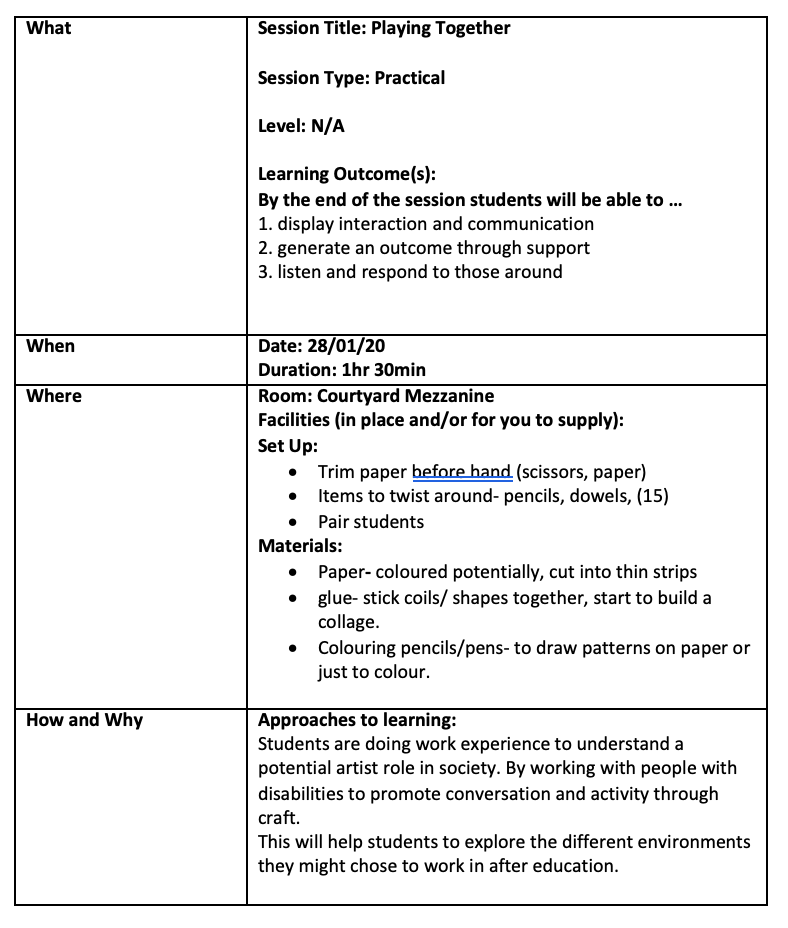
Quilling lesson plan
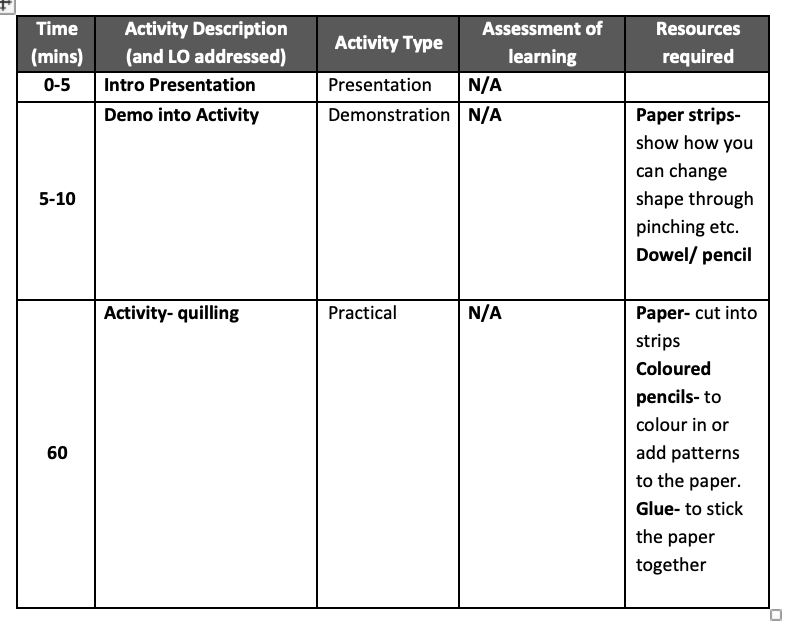
Quilling lesson plan
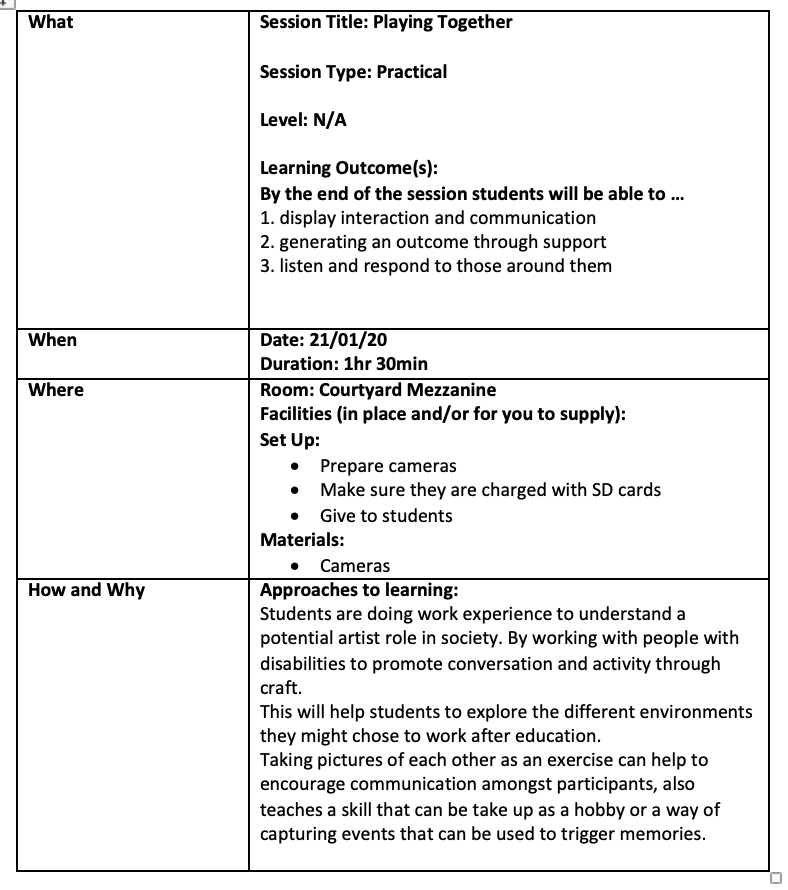
Photography lesson plan

Photography lesson plan
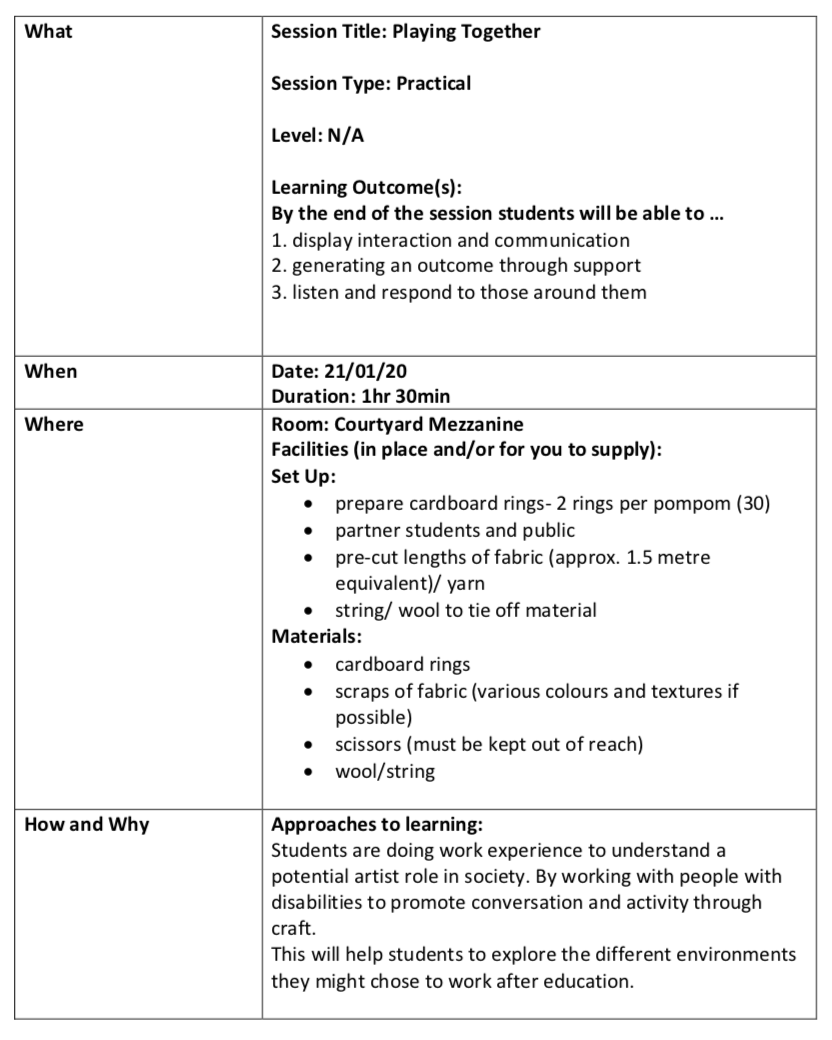
Pom pom lesson plan

Pom pom lesson plan
The other thing I’ve been involved in this week is starting to help students build their portfolio. I haven’t looked at adapting my portfolio since I was on this course and so this was not only helpful or me in the sense of looking at teaching but also in considering how I could adapt my portfolio for when I want to apply for jobs once I have finished university.
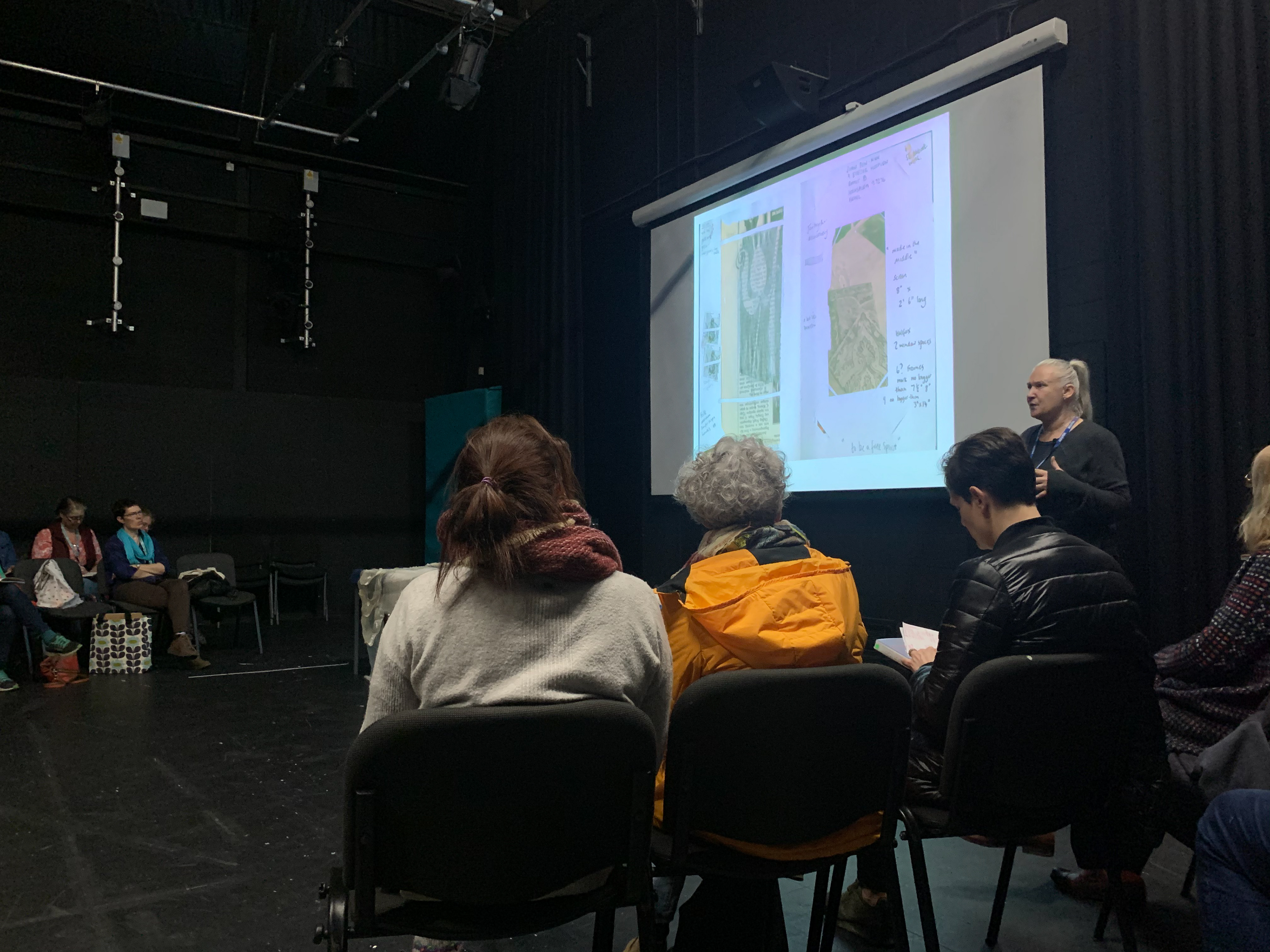
Visiting lecturer Amanda J Clayton

Portfolio building introduction
WEEKLY QUESTIONS
What have you learnt over the last six or seven days while out on placement in terms of skills, knowledge and about yourself?
I have mostly learnt about myself that I can be comfortable in this sort of position. I am not the most confident person and so going into new situations can be stressful for me; this is one of the reasons I chose to go somewhere that I know the people and the environment. I managed to settle in quite quickly and also managed to get involved in tutorials and already found ways to share my knowledge of materials, processes, and practitioners with students in a way that will help them to develop their projects. I managed to do this in what I feel was a confident manner.
What has been most enjoyable or beneficial to you over this time and why do you think this is?
The most beneficial thing for me so far is how much they have included me in the day to day tutorials and planning, whilst also trusting my opinion. As I said I struggle with me confidence and so I was worried that I wouldn’t necessarily have much to contribute to this environment, but I do seem to have a knack for listening to the student and providing appropriate responses. Students have mentioned that I've actually mentioned things that they wouldn’t have thought of as well as receiving a compliment from a member of staff, who was my personal tutor when I was a student here, that I have a natural affiliation to the role of tutor/teacher. This was not something that I expected to hear, and so has really helped me to consider whether I would make a good teacher
What has been least enjoyable and again, why do you think this might be?
The thing that I have probably struggled with the is the social side to the role. All the tutors share an office which I have been spending a lot of time in between tasks. I say this because I am seeing a different side to the tutors; obviously I am not a student here anymore and so they talk to me in a different way, it's probably this adaptation that has been one of the most difficult things for me to get used to.
Have you been able to develop any particular personal or job role skills over this time?
The main thing that I would say has been developed it my questioning skills. During tutorials I have had to try and guide students to go further into their projects and try to add justifications to where they want to go with their projects. For I may from my own path from what they are telling me, but it is trying to make them find their own way that is the job. I was told “you can’t do the project for them” and I know as a recent student I was more invested in a project when it was from my own thought process and inspiration. The other thing that has been good for me to develop is the planning side of things. Doing the teaching plans for the workshops has meant that I have been challenged to think deeper into what it takes to plan a session.
Are there any areas in your performance where you could improve your input and, if so, how?
I could probably be more active in engaging with students without the tutors being there. This more one to one interaction would be beneficial for me to understand what it can be like as a tutor. I could also challenge myself more to interact with the staff in a more relaxed manner.
How do you feel about the experience so far, and have these feelings impacted on your work at any time?
I’m not going to lie I felt very nervous about starting this placement. However, I feel that it has gone very well. Everyone is extremely polite and being very honest with me about what it can actually be like. Someone has also spoken to me about the potentials of doing HE and/or FE, and how this can affect what kind of qualifications I need to achieve. As people have been so welcoming, I can feel myself starting to relax and in turn I'm starting to be open to getting involved with students and staff alike. Even if I don’t go in to teaching, I feel like this has been a great experience for me so far just to help me feel more comfortable about voicing my opinions and suggestions to those around me.
Can you identify areas where you would like to improve your skills, and how do you hope to do this during the coming placement days?
I hope to start to feel even more confident. I also have the workshop on Tuesday that will hopefully introduce me to some students making it easier for me to start to create those connections which will allow me to explore the tutor role in more detail.
WEEK 2
The first session for the playing together workshops was the photography plan. The cameras were to be used as more of a conversation starter, pictures would be good however, the idea of the workshops is to increase the community interaction. So, there were a few images however the general outcomes for the day were for the students to listen and talk to the people which they did very well. Below are a few images that I took from the sessions.
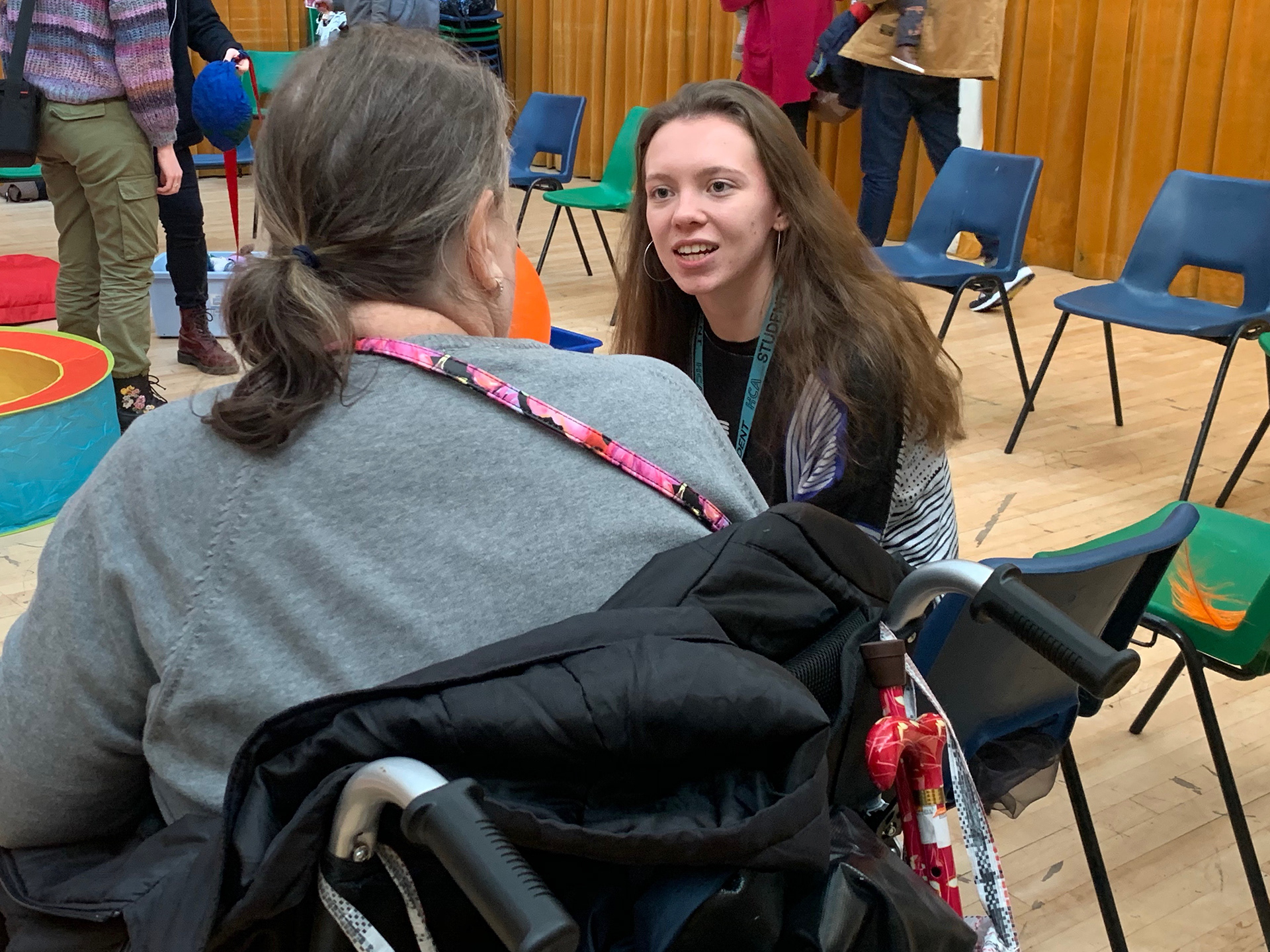
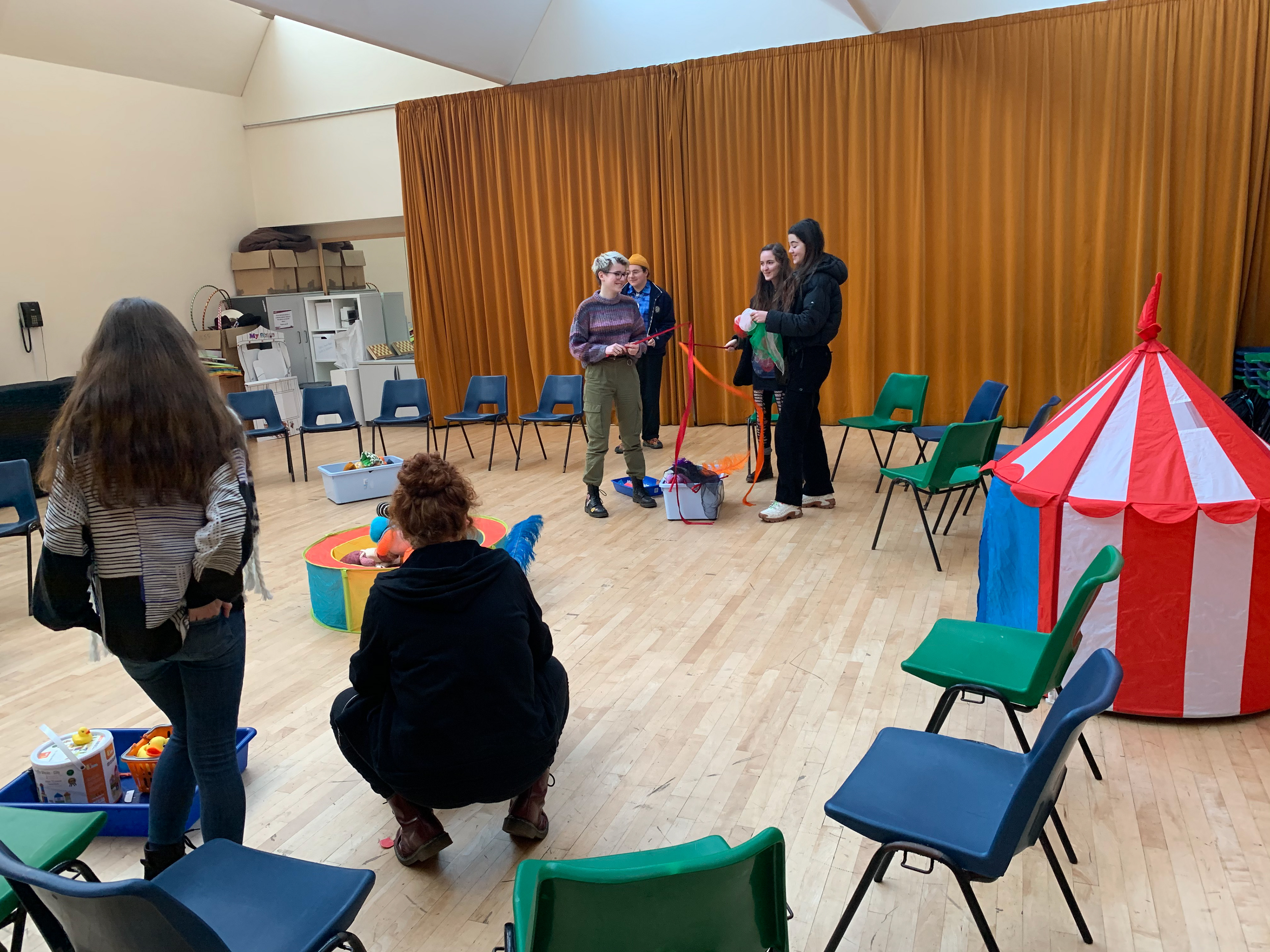
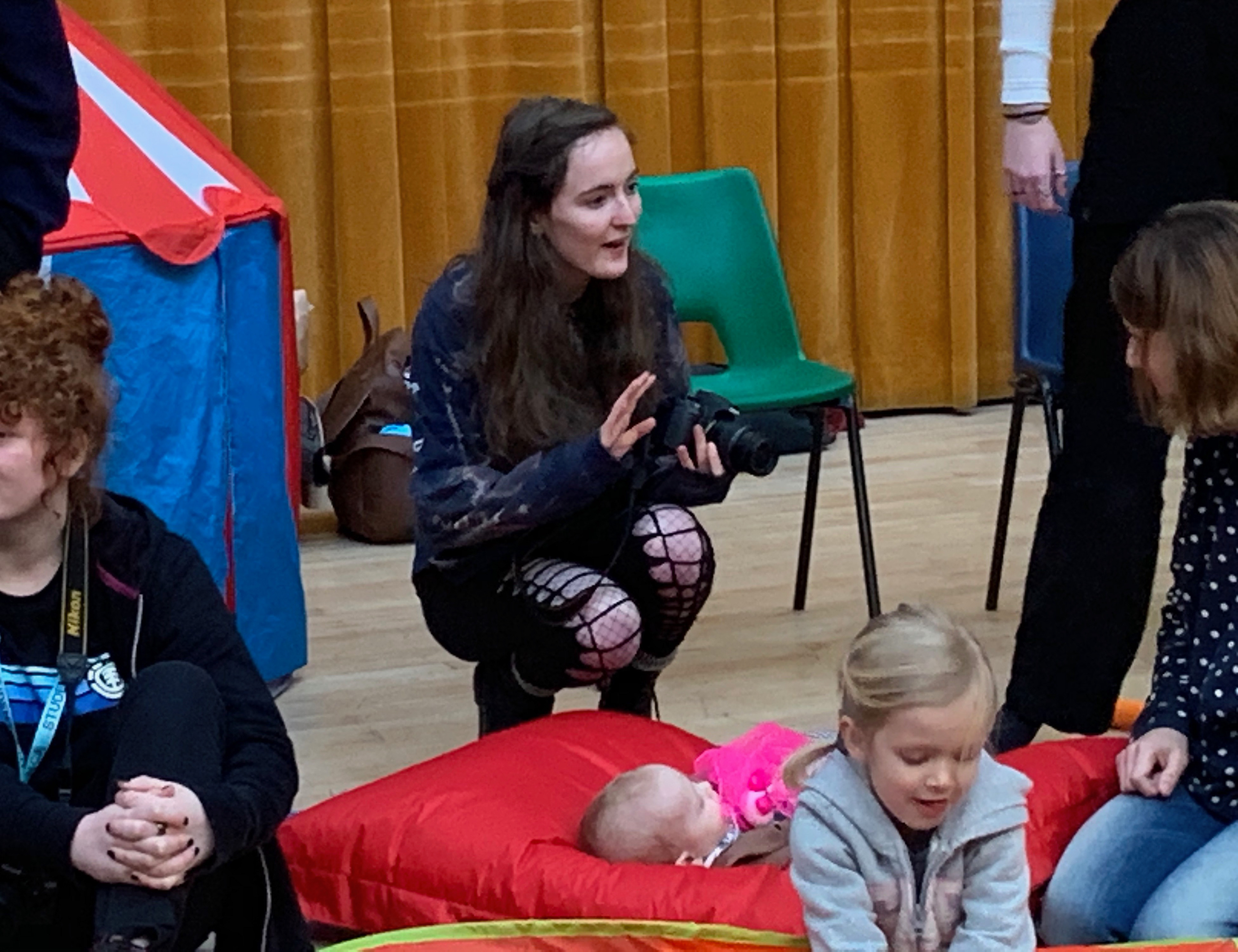

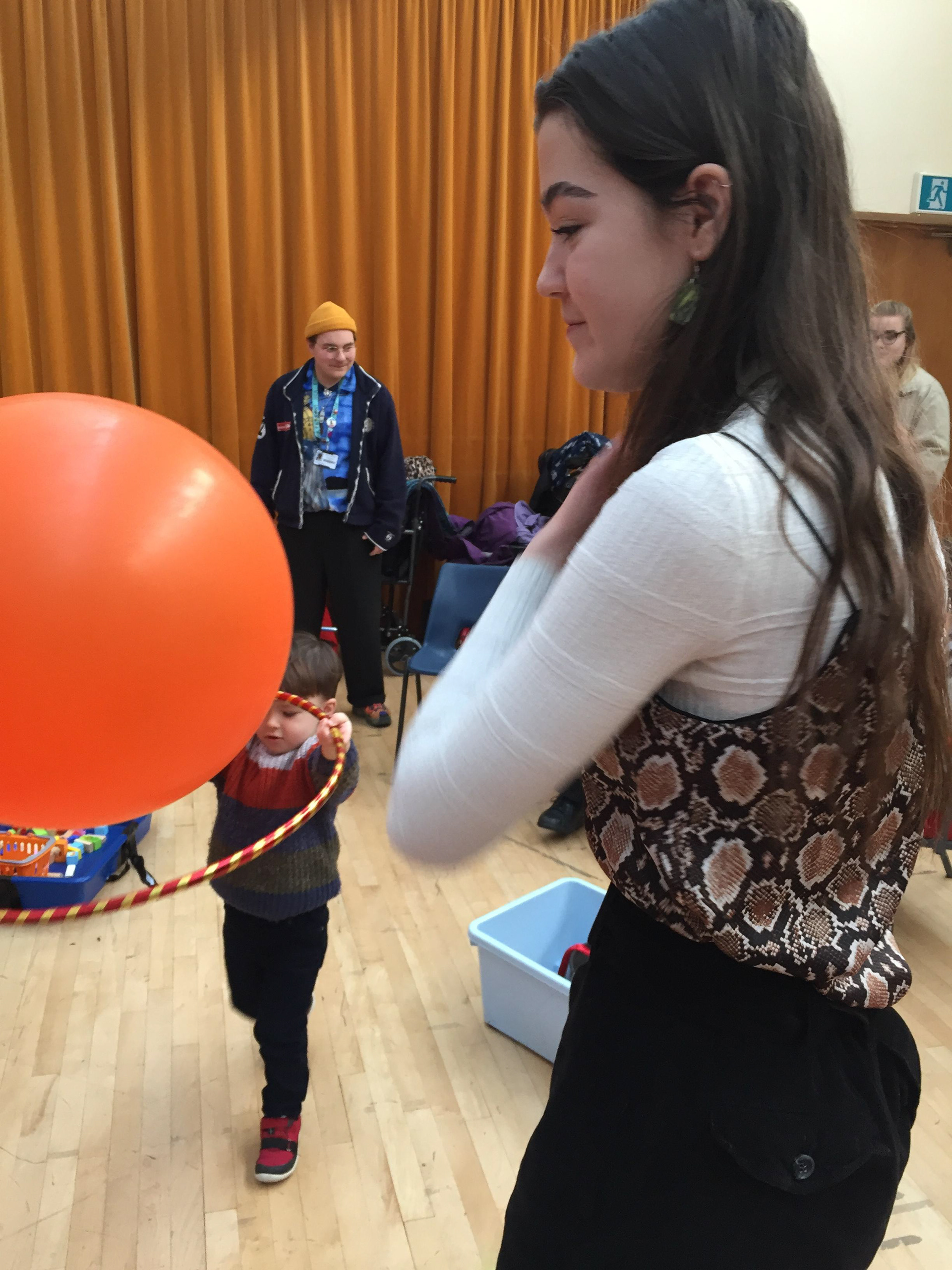
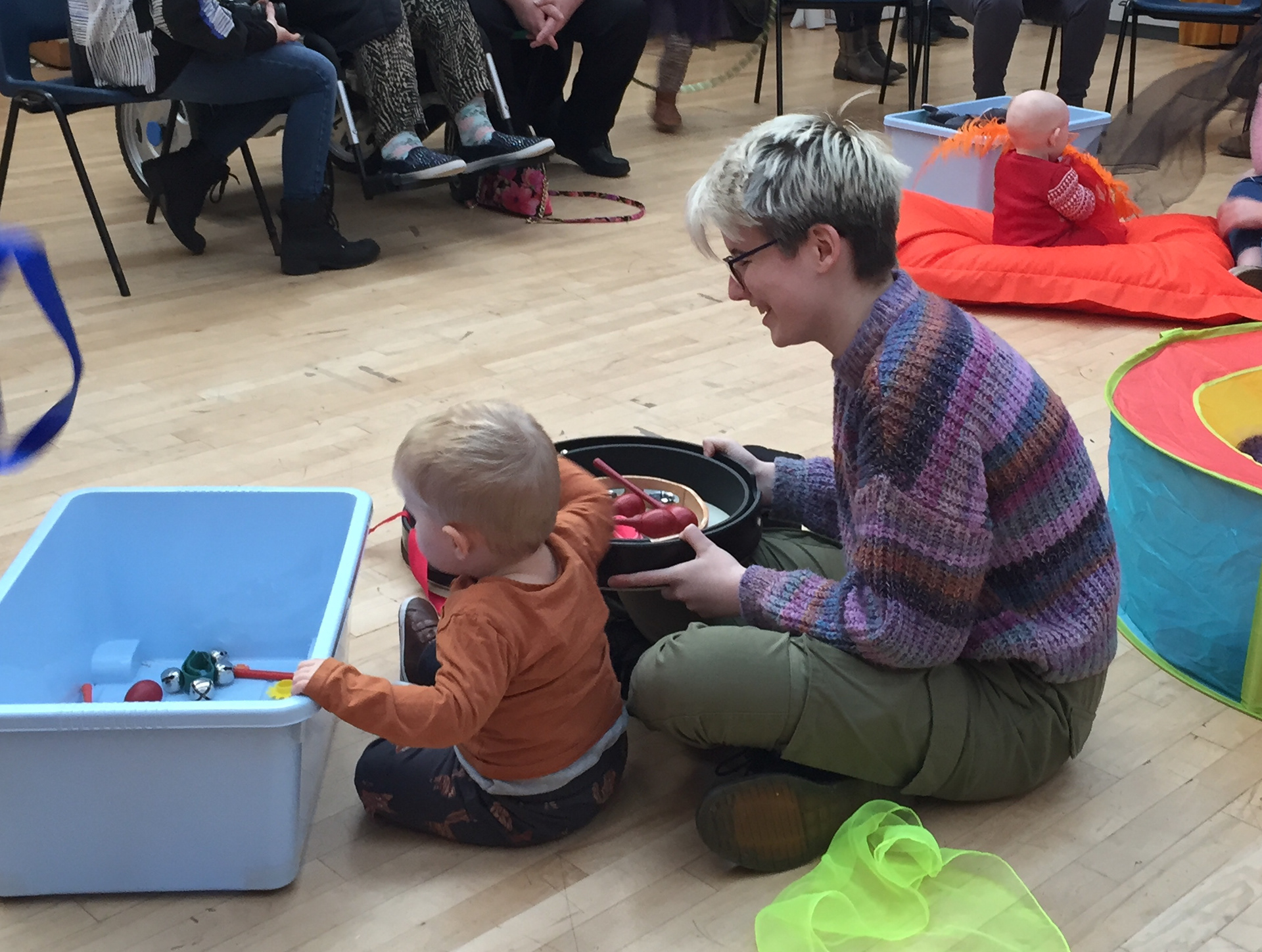
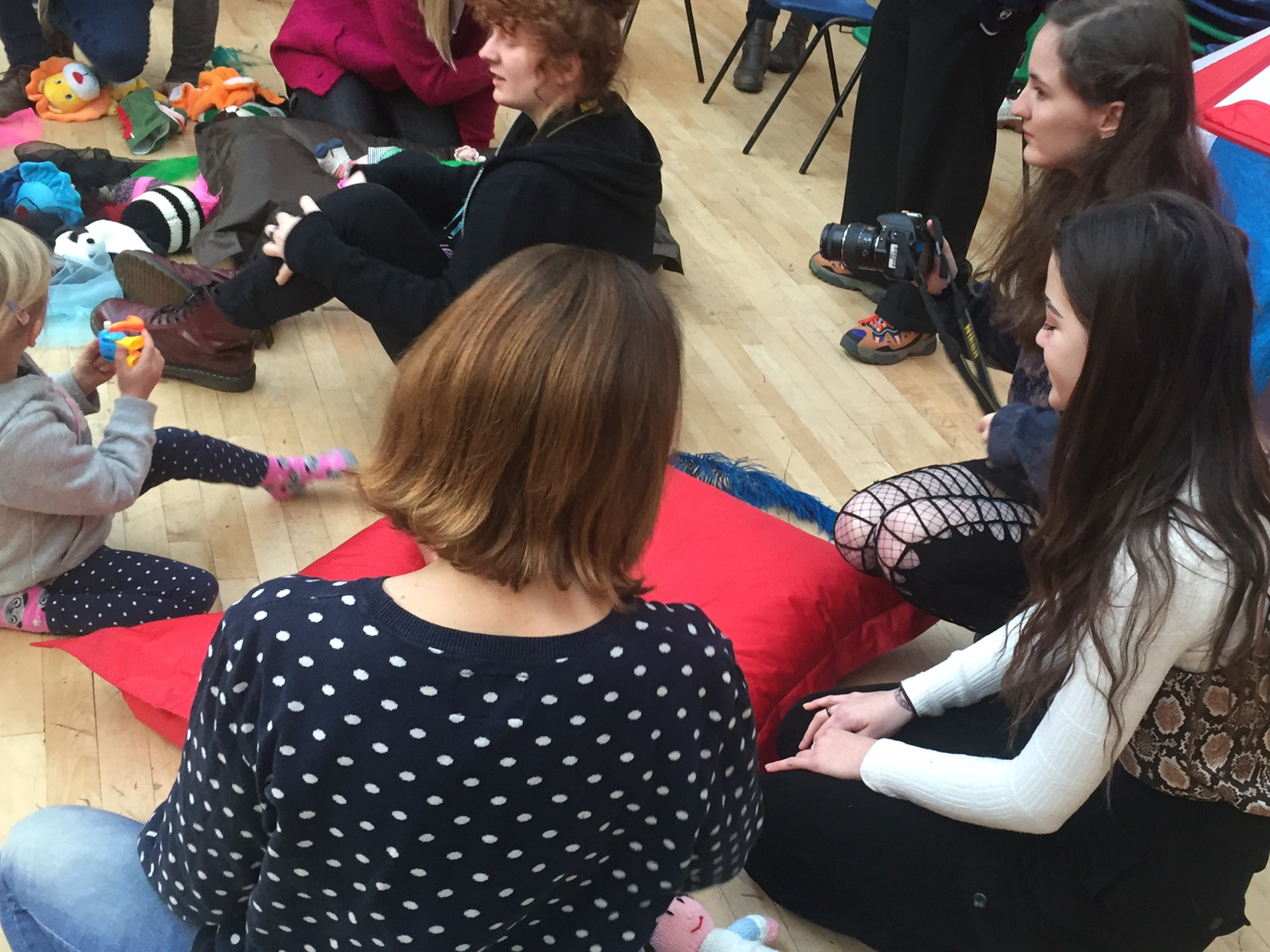
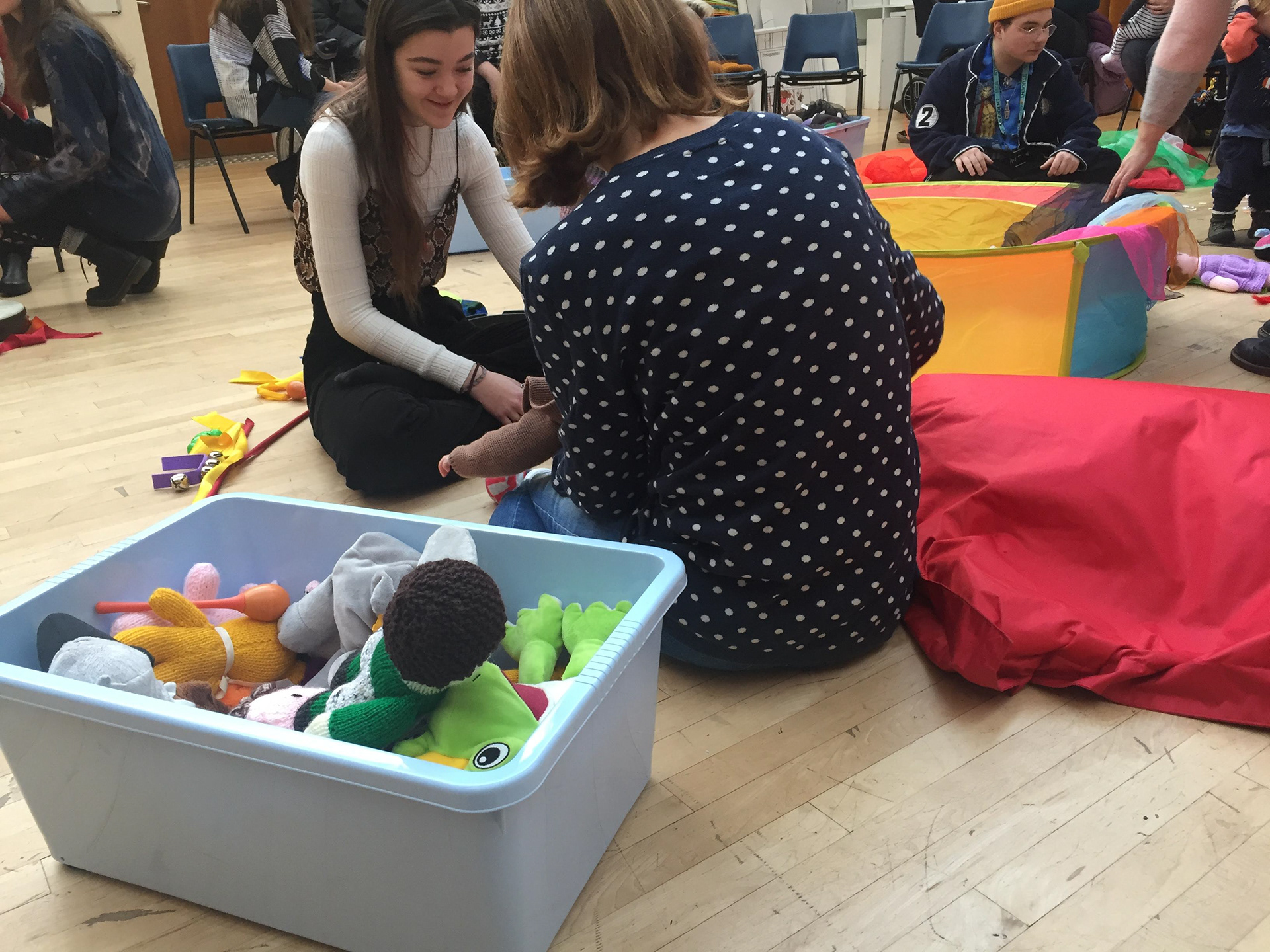
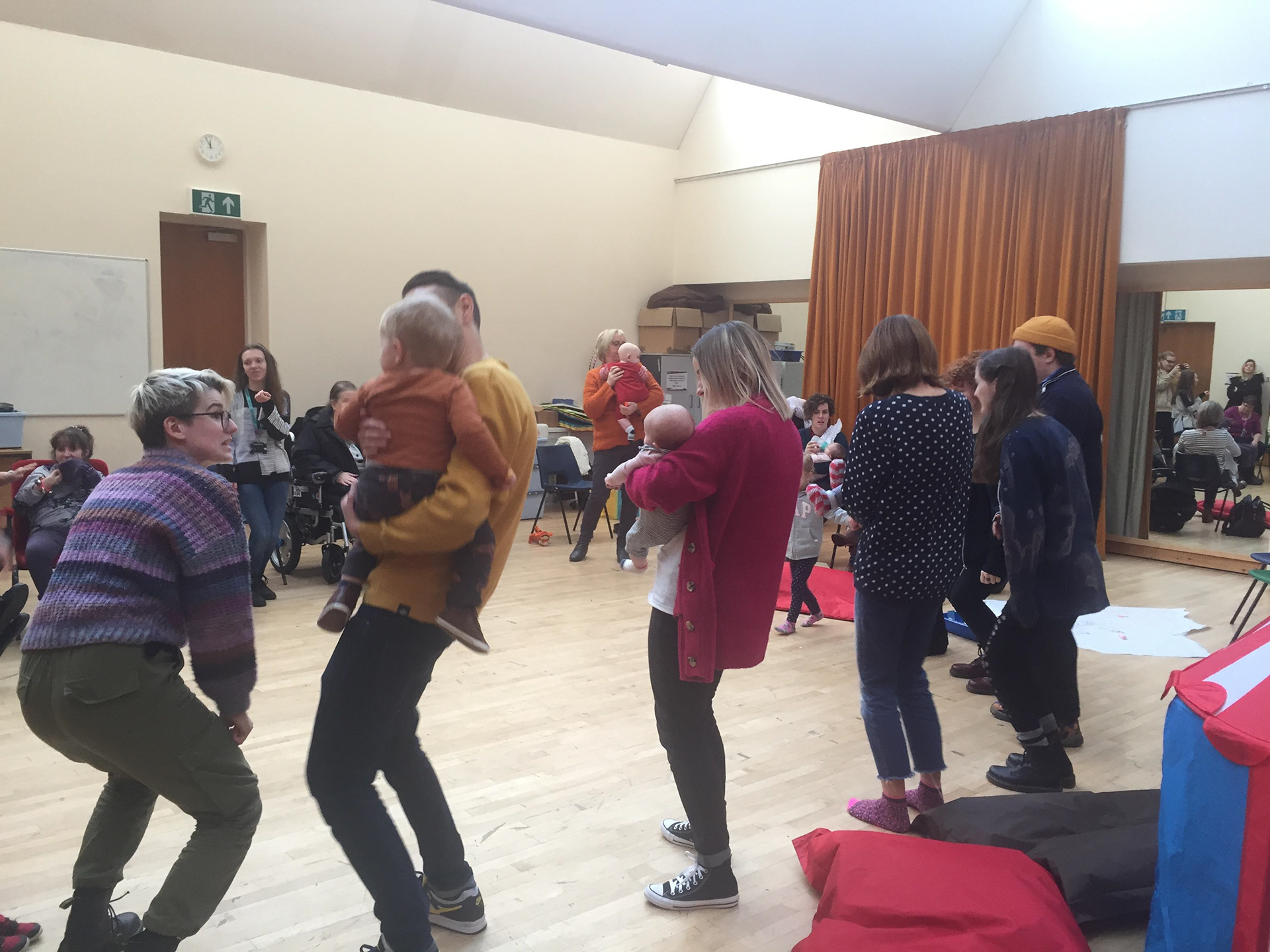
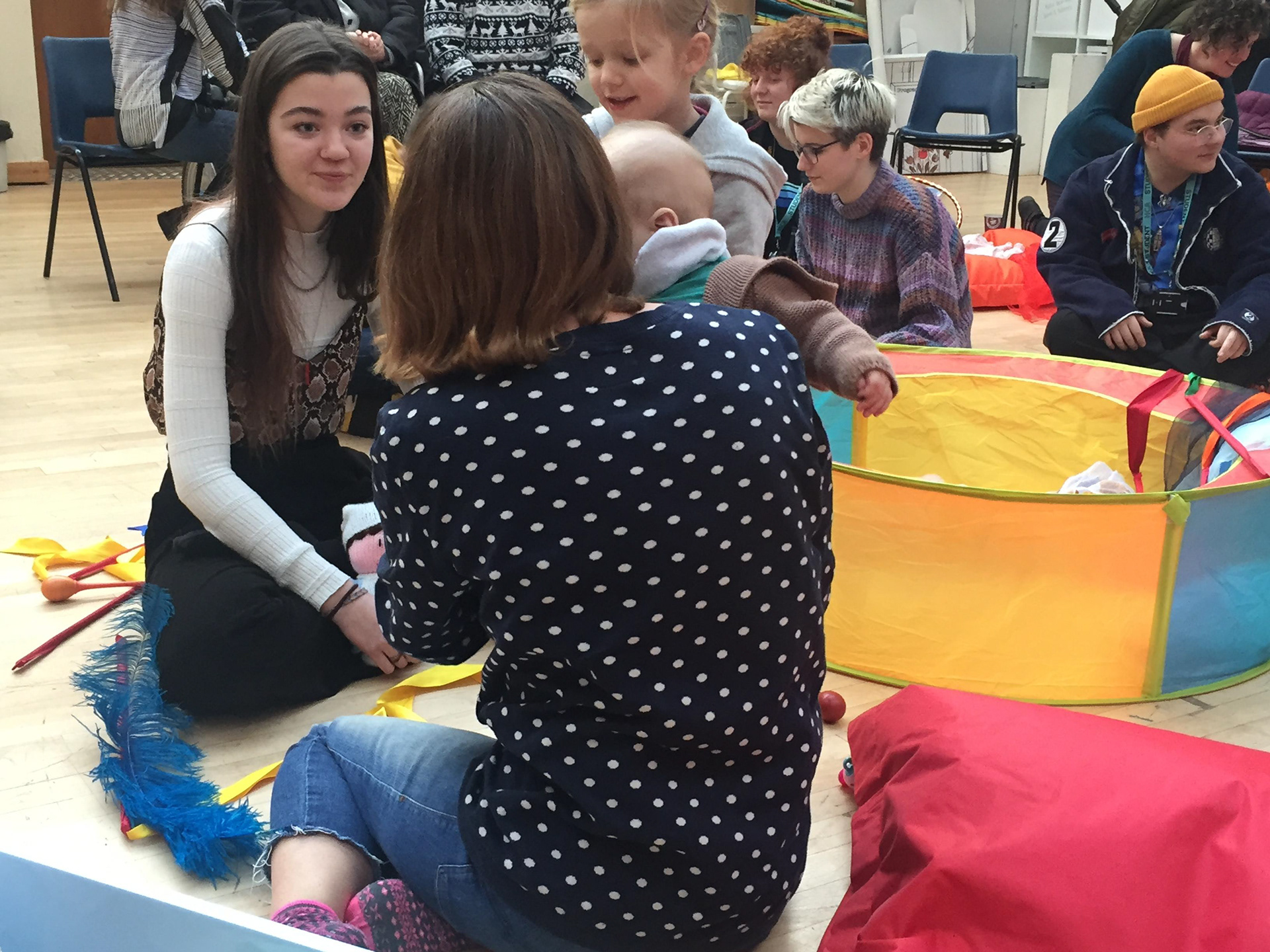
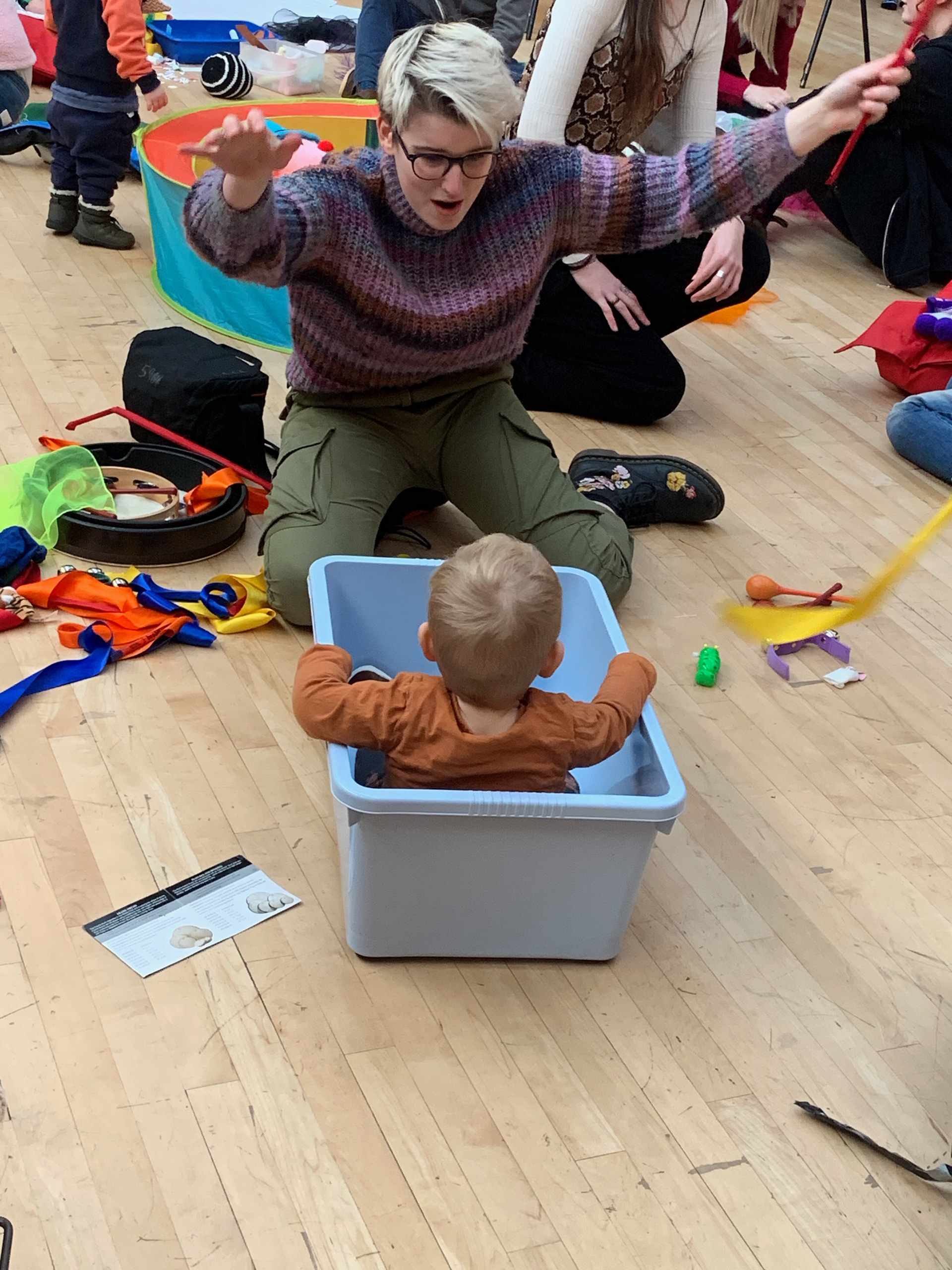

This was good for me to see another side of the whole education idea. Hereford college of arts is all about community integration and they do several workshops like this throughout the year. Not only does this work as a community project but also acts as a work experience for the students which they can include in university applications as well as introducing them to the role of a community artist. One of the students also decided that they would love to do this sort of work after their qualifications. Opportunities such as this are a great way for the students to understand the different directions the creative minds can take them in. It is the responsibility of the tutor/lecturer to guide them and inform them of all their potential positions in the creative industry, which is something that I have started to understand as the week has gone on.
As well as preparing for the next play together sessions, I have also been involved in a collaboration between the foundation course and Performing arts (both FE and HE). Every year the performing arts courses at Hereford College of Arts do a production for the hay festival in Herefordshire. The production is aimed at children and is normally inspired by a book that is featured at the festival. From the selection of books this year the students and course leaders have chosen to do a dramatisation of a poetry book called ‘A kid in my class’ by Rachel Rooney and illustrated by Chris Riddell.
It would be the position of the foundation students to create a set that could be adaptable to the different poems as well as engaging to the young audience. This Friday saw all the involved students getting together for the first time to talk about ideas and how they could potentially make them happen. By the end of the session it was decided that the set would most likely be a large oversized book that the performers could turn between the different poems and that it would also be acted out as a musical. This would mean music, performing arts, and foundation students all coming together on this project. This will be an amazing opportunity for the few students involved to get an idea of what it can be like to work with potentially different minded people who will have different views on production and how things will be made, but also working to a budget and a strict time frame.
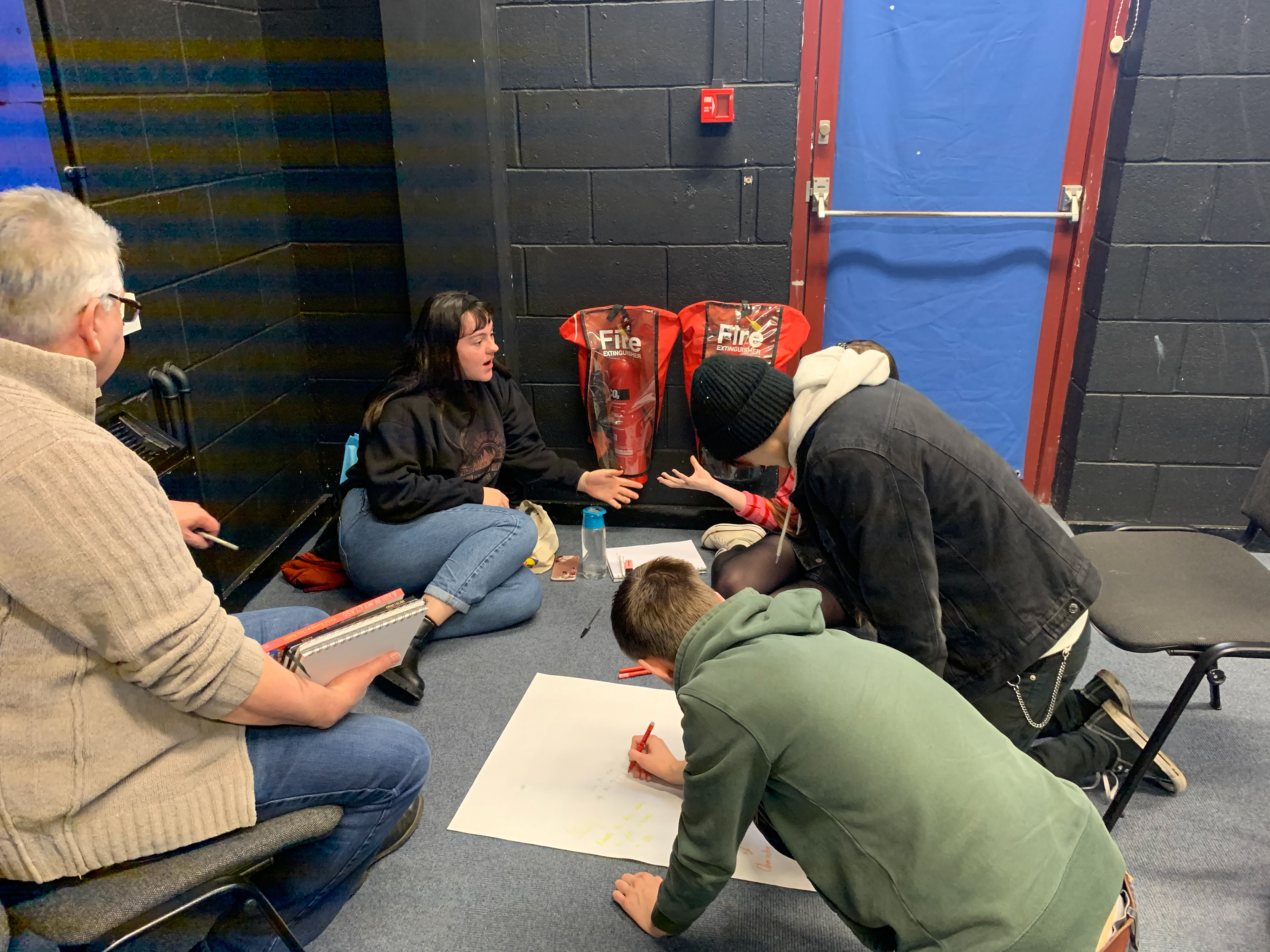

Unfortunately, I won't be around for when this project gets realised however it was still a good opportunity for me to see how cross disciplines can work together and generate ideas. I have done projects at CMet with different courses, however, those were still design or craft-based courses, so to see how the truly different can work together was quite interesting. The performing art students were very focused on how the piece was going to be performed, whereas the music students were more concerned with how the pace of the piece was going to go along with the different singers' keys etc., the foundation students however were thinking about material availability, space, transportation, and the budget. This was a great way of seeing how we all work differently as creatives.
WEEK 3
This week started out with me having the chance to help in an animation workshop. At a time, I had considered going into animation or cinematography so it was amazing to have the opportunity to have a go at animating again.
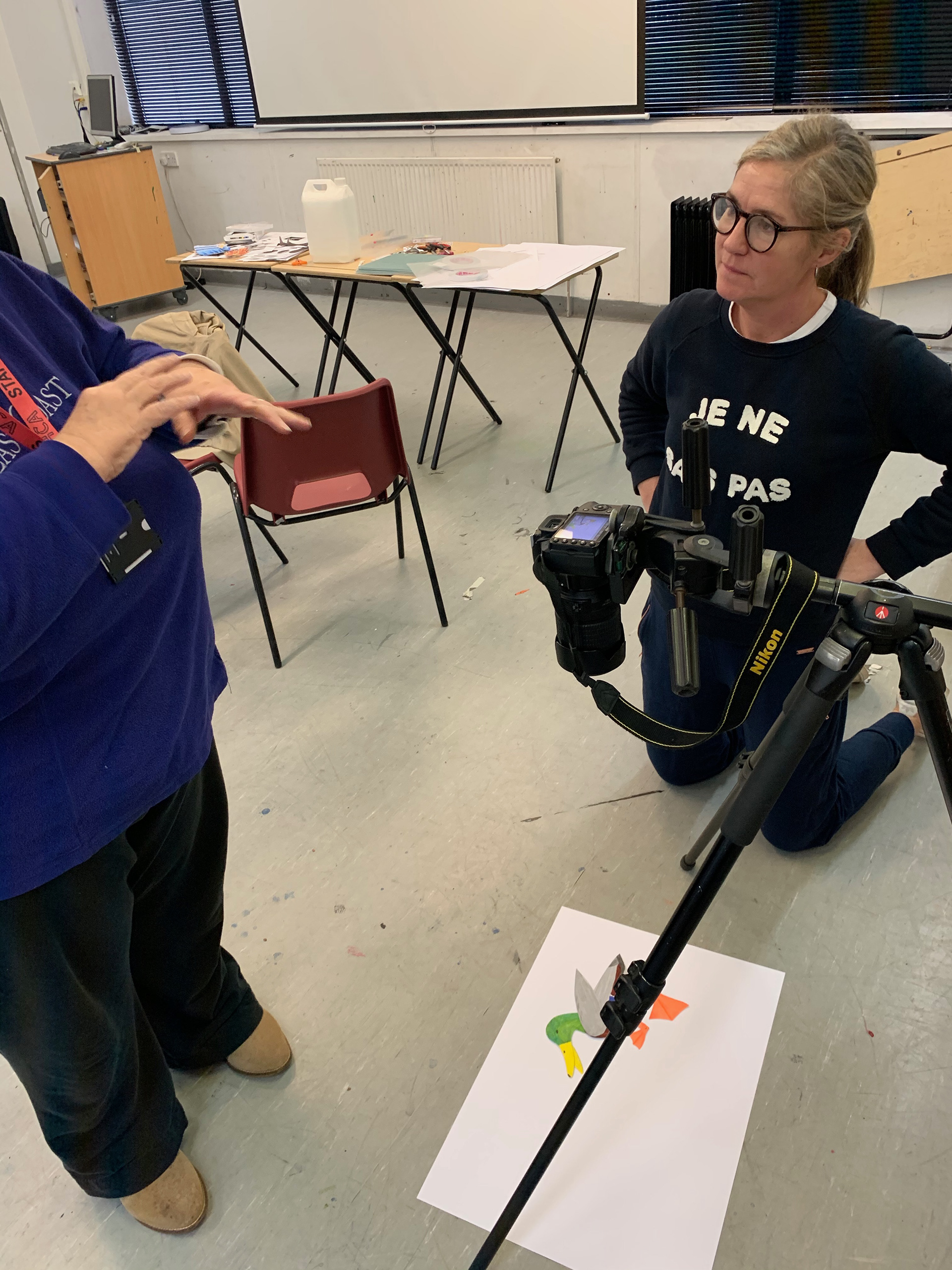
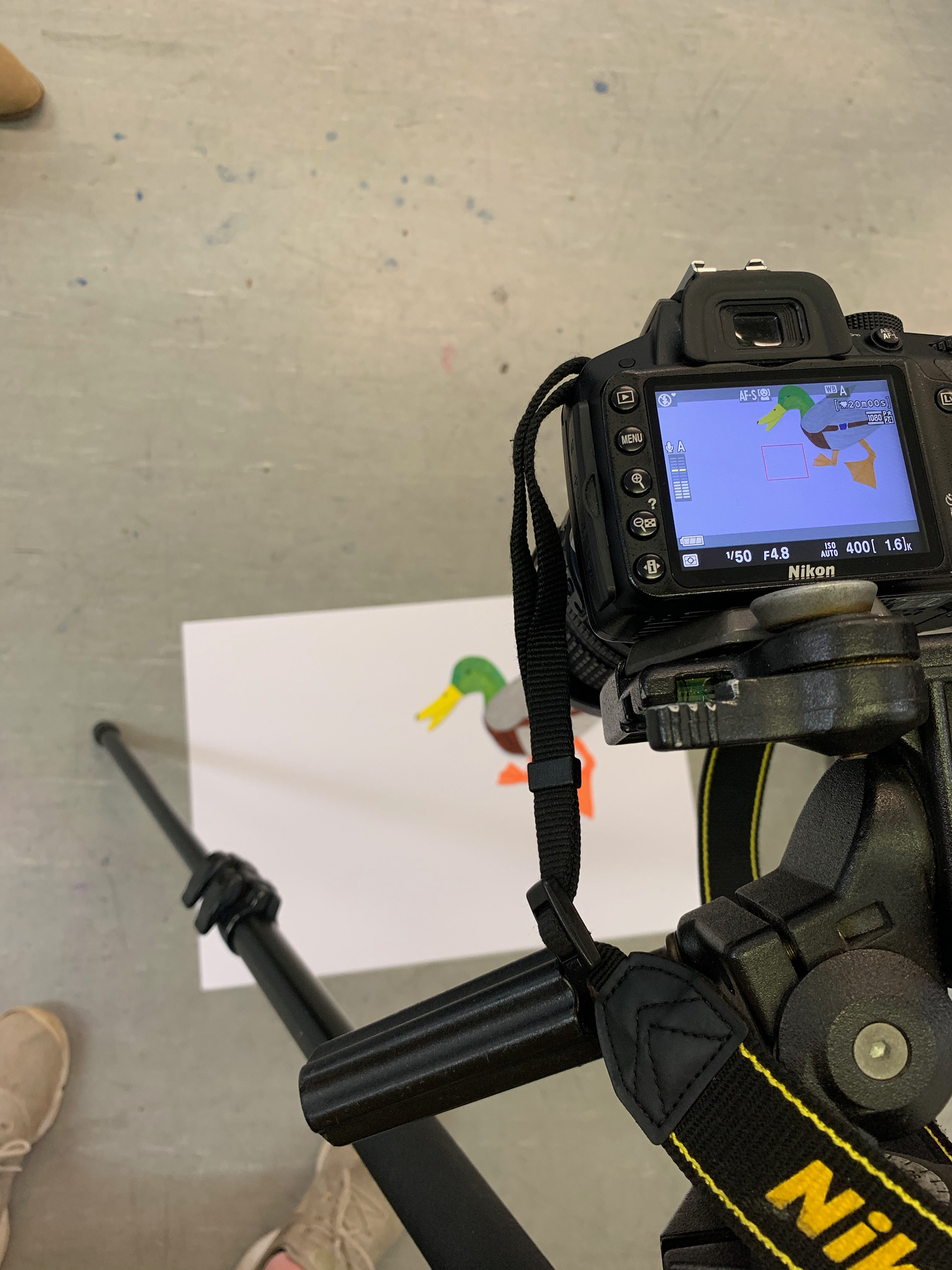

I specifically helped with the animating of their images using photoshop. There was a mixture of students in the group including mature students and foundation, just feeling the different interactions from the different age groups was very enlightening to me. The younger students seem more on edge almost, so it’s trying to gently prod them in the right direction, whereas with the mature students they are almost more willing to ask for your help; young students might just sit there and struggle.
Also trying to help them personalise or develop their animations in a way that would enhance them is potentially a difficult area, particularly when I do not know the students that well. For example, one student was pointed out to me at the end of last week as someone who would potentially be a challenge for me if I decided to become a teacher. The student was extremely quiet and rarely spoke to any of the lectures, it was suggested to me that trying to start a conversation with him would be a good insight for me. I didn’t manage to get a chance to talk to him last week however, he was one of the students in the workshop today. I have a personal experience with language and communication issues, and so I kind of knew that as he would say what he was thinking that I would have to be more attentive to his body language. If I suggested something, he would give a very slight head nod or shake, it was these sorts of cues that helped me to move the conversation along in a way that would be helpful to him and productive for me.
The suggestion to try and work with him was beneficial to me, I hadn't really considered the possibilities of working with people with these sorts of needs. I know that I probably wouldn’t be able to work solely with people who need the extra help however it was good to realise that I could in fact cope or adapt to this sort of situation. The biggest problem that I found was trying to not appear condescending; these are still young adults so they will probably not appreciate being talked to a certain way, they just might not be able to communicate it.
The second playing together workshop took place on the 28th. This one was organised as a pompom making workshop. There was a lot more preparation that had to go into this session specifically in the materials. We had to prepare disks for the pompoms to be made around; we made 15 pairs in total, as well as various fabrics and wools cut into usable sizes and strips. The challenge with this was making sure that we had enough prepared. As it turns out we had enough of the fabric but not enough of the disks. Given the workshop before where there was more playing than the workshop being done, we thought this was enough. This just proves how unpredictable these type of things can be.


The one thing with this workshop that we really had to be careful with was the scissors that would be needed to cut the pompoms. Since the workshop is with vulnerable people- children and disabled adults- we had to be extremely careful about having the scissors out of reach and sight to avoid injury, as well as not just handing them out. These are the sort of health and safety precautions that needs to be taken into consideration when planning these types of events.
This workshop was undertaken with a different group of students and so it was interesting to see if they interacted differently with the public. As there were more adults then children this week there were more conversations happening which was good to see. For those with carers it gave them a bit of a break as well as someone new to talk to. The students did an amazing job of getting the different people of different situations and abilities to engage with the activity. I think this was due to the tactile nature of the workshop. There was more engagement than the first one due to its easier engagement. Photography isn't very applicable to people of a younger age or those who have reduced motor skills. It was a lovely idea but not really the sort of place for it to be carried out. The pompoms were easy for them to do overall, the colours were stimulating, and the pulling through of the thread or fabric was an easy motion for them to do.
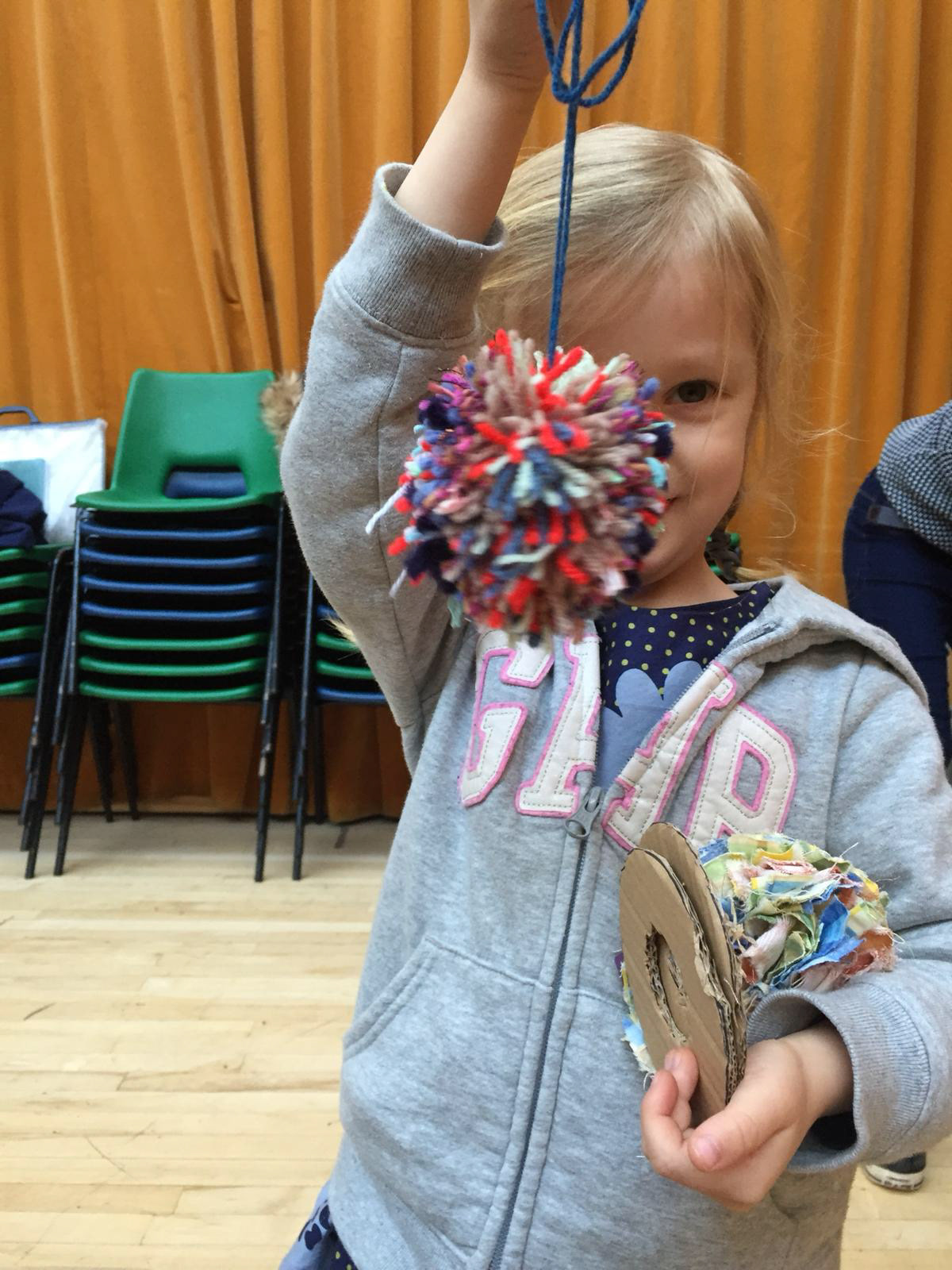

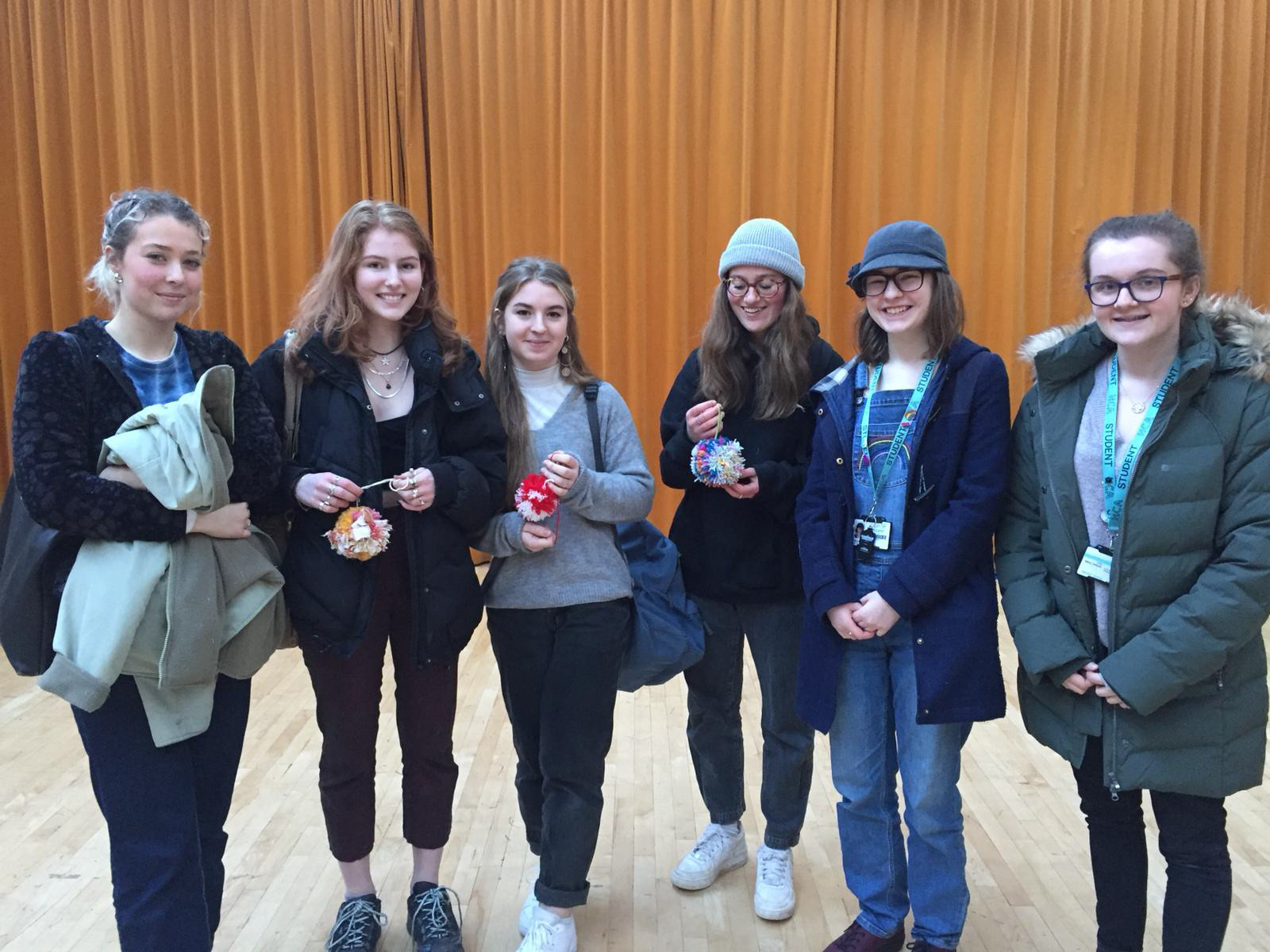
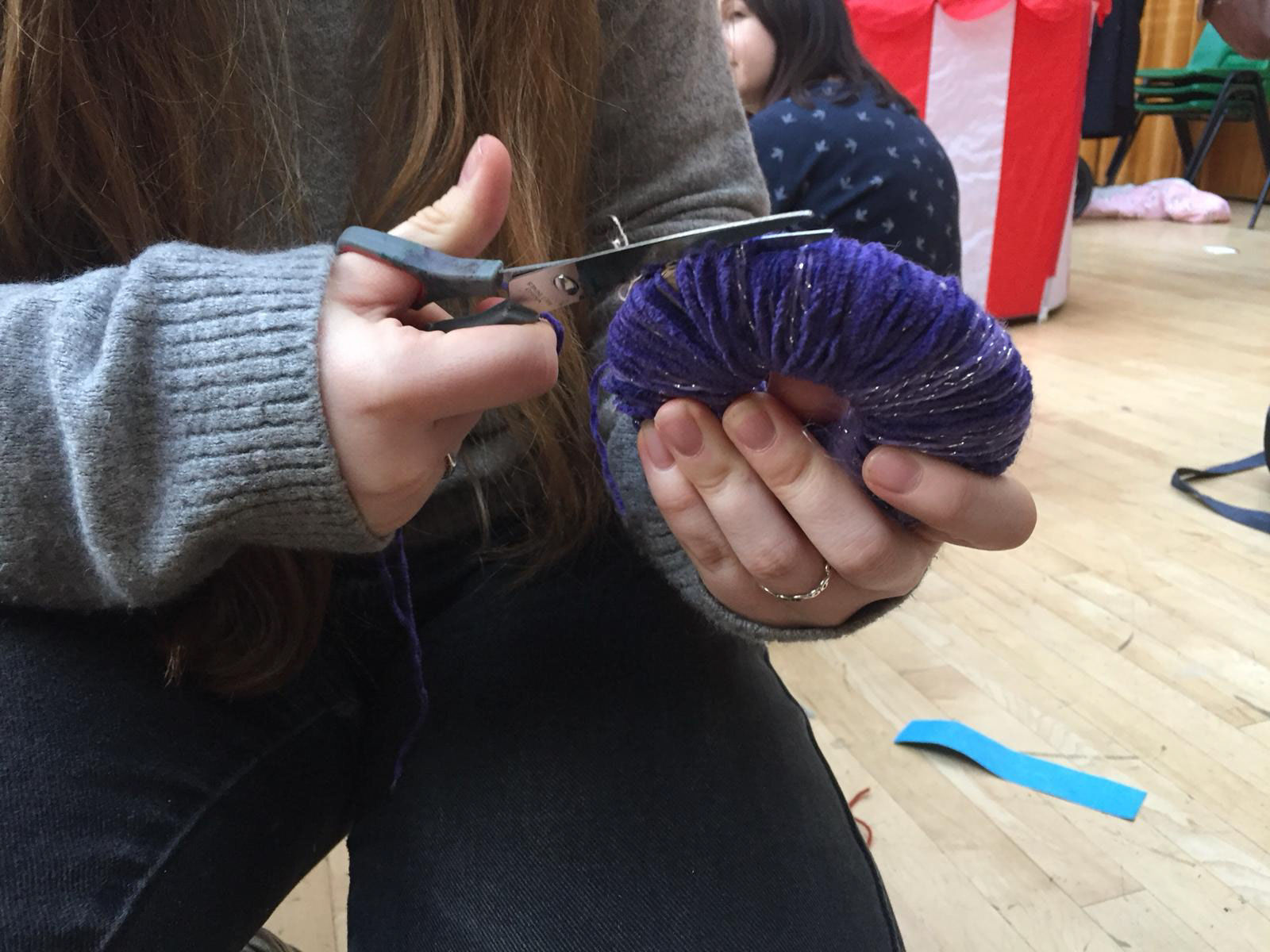
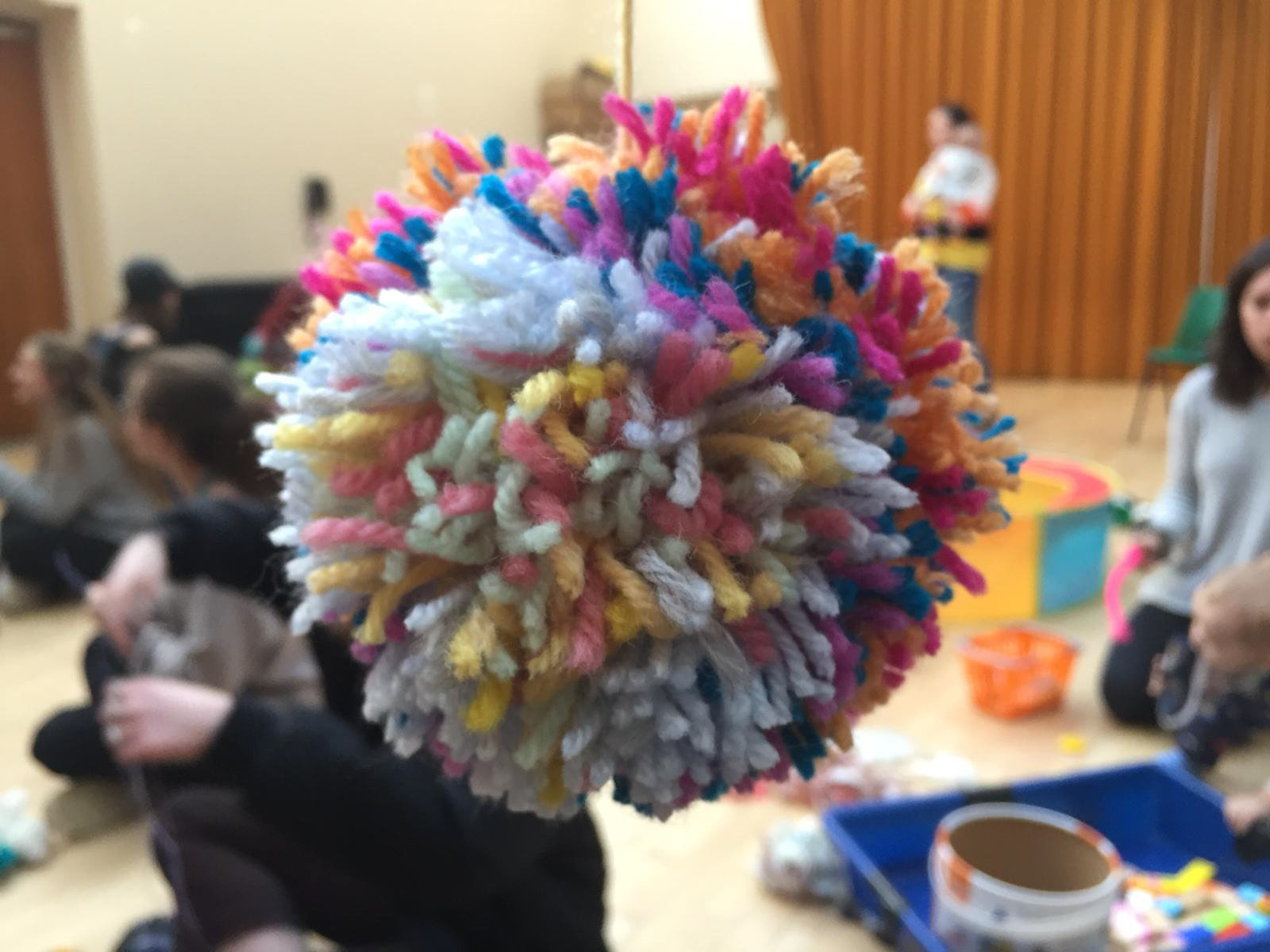

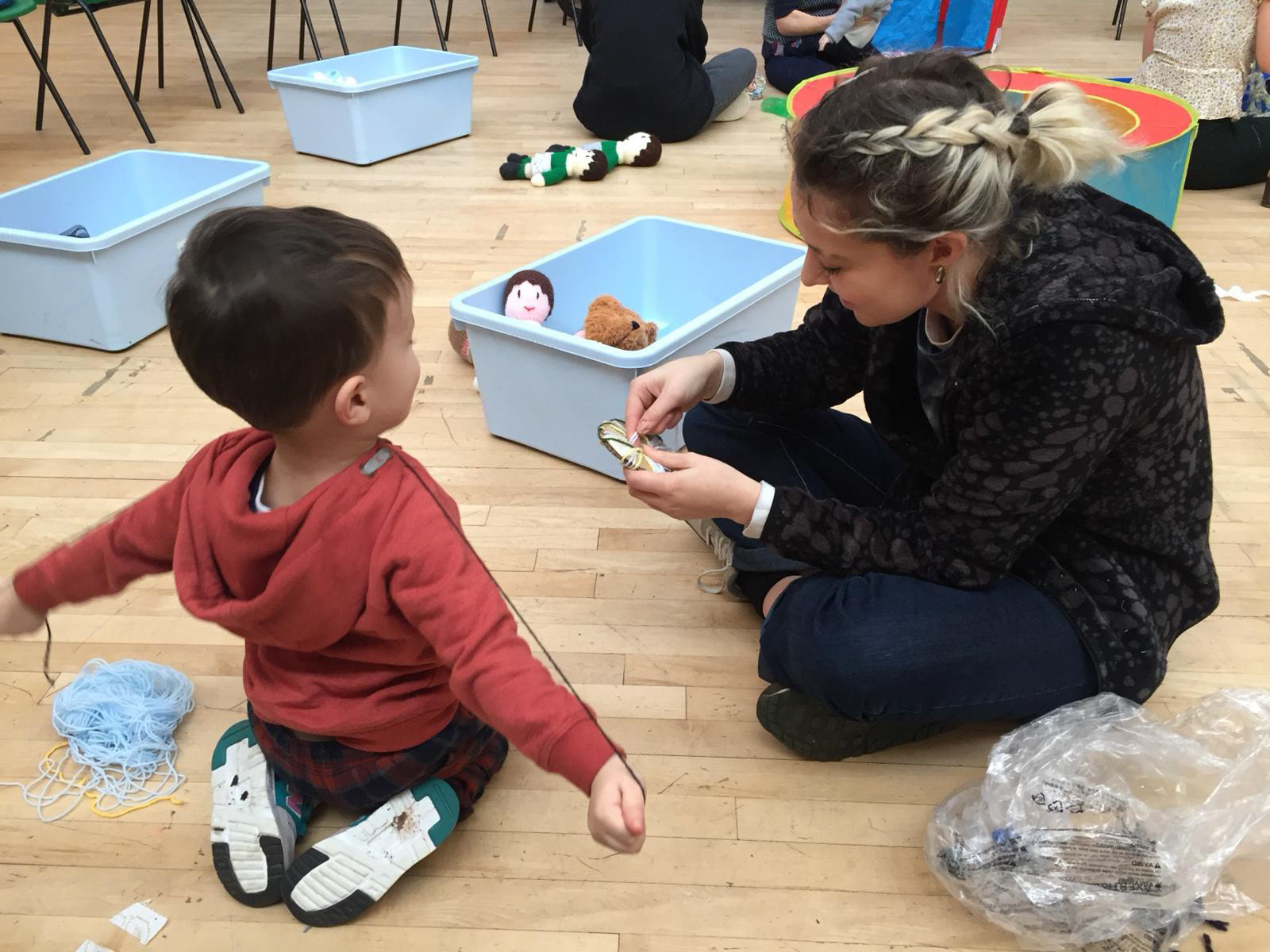
These workshops have been a positive experience for me. I never really got an opportunity to do this sort of thing when I was here and so seeing how the college is trying to get even more involved with the community is fascinating. It was also great to see how the students have benefitted mostly for their confidence and interaction skillset.
What have you learnt about yourself as you continue your placement in terms of skills, knowledge and about yourself?
The key thing that I have realised about myself during this time is that I worry too much. I was worried at the start of this placement that I would just be a nuisance and in the way during a very busy time of year. However, they appreciated my help and input more than I thought they would. I was also worried about how the students would receive me. I was a stranger coming into their space and telling them all these things that they could do or look into, that isn’t actually that much older than them and I know from personal experience that it can be very overwhelming and in some cases counterproductive. However, the students were very welcoming and took into consideration the things I had to say, even the older mature students appreciated my alternative ways of approaching a new task. I have decided that I need to believe in myself more because I am where I am for a reason. There were other, more hands-on skills that I have rediscovered during this placement such as photography for products and models and also portfolio building, these were skills that I had touched since I was on this course and so it was good to see these be used again to help students who are in the same position I was in only two years ago.
How do you feel about the most recent experiences and have these feelings impacted on your work at any time?
I feel extremely positive about my experience. It has definitely helped me to decide what I want to do with my future. The advice that I got about doing a teaching qualification has been beyond helpful and was exactly what I needed. With my current personal problems, it has been eye opening to see how supportive an environment I could end up in. As they were my old lecturers, they already had an idea about what has been happening for me in the last couple of years. They also checked up on me about what is happened and still happening. I know that they are an extremely supportive team and that is something that I would strive to have in my future years and professional practice.
In what ways are you now better prepared for each day in work?
I’ve realised that there isn’t any way you can completely plan a day. When doing the teaching plans, I thought that they would go exactly to plan. However, there was a different amount of people than what I planned for. As well as this, the sessions could also be more play orientated as opposed to the session that we planned. This will help me to deal with my projects when they don’t always go to plan, as well as time management and reflection.
FINAL thoughts
I chose to do this module because teaching college/foundation level is something that I have been interested in for a while. I always thought there would be something satisfying in help young people find I went to I knew that there was an extremely supportive tutor team. If I do go on to teaching, I aspire to be like them; encouraging, supportive, and generally inspiring.
In my time there I got to experience different sides of what would be involved in this role. The team there assured that I would get an opportunity to try lots of different things. The activity that stood out the most to me was the workshops. As got to be included in the planning and activities, I got a good idea of how valuable this sort of exposure can be for the students. It was also interesting from the planning side of things since it was unpredictable. No matter how much you plan you can’t be sure how many people are going to turn up, if the event starts on time, or if they will even be interested in the activity. This was shown to me through the different events; the pompom workshop was a success, but the photography was not. This was probably the activity that the students were the most excited about, however I just don’t think it was right for the audience that had turned up.
The other thing that was significant to me was the work I got to do with those who need extra support. I had considered this when thinking about teaching. I had only ever had personal experiences with learning disabilities and so it was interesting to see the contrast between the two and how there are similar frustrations in trying to do an activity. I wish I had got to spend more time working with the student just to see if I could make headway with them and got to have a strong, resulting interaction. This is one of things I didn’t expect with teaching; how frustrating it can be to students and staff when communication isn’t strong.
This placement has not only helped me for the future but also in the way I currently work. It has helped me to realise that I could be confident enough to teach what is most likely one of the most difficult ages to connect with. It has also made me realise that a strong relationship with those around me can be key in helping to achieve my goals. I want to be someone that is approachable, and people can confide in. This is something that was invaluable to me during my time at HCA. I now know that I need to strive to be more adaptable yet being able to plan is something that is also vital.
I know that I do not want to go into teaching straight out of university. I want to have my own practice with a good amount of industry experience. Teaching is what I will aim to do once I feel I have ample knowledge to pass on so someone else can benefit from my experiences.